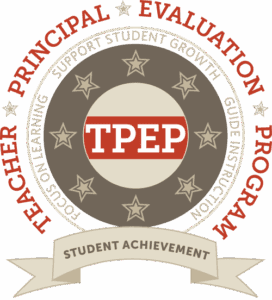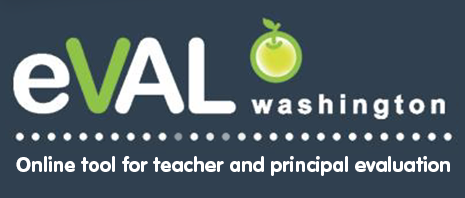Meaningful conversations and accurate ratings create trust in the system
About TPEP
Teacher and Principal Evaluation Program
To assist districts through the collaborative learning process, ESD 112 can provide:
- Facilitation of professional growth for district leadership teams that provides guidance for Student Growth implementation
- Support all stages of implementation as defined by OSPI.
- Support for the use of eVAL as a data management tool
- Technical assistance to districts
TPEP Core Principles
- Quality teaching and leading is critically important.
- Professional learning is a key component of an effective evaluation system.
- Teaching and leading is work done by a core team of professionals.
- Evaluation systems should reflect and address the career continuum.
- An evaluation system should consider and balance "inputs or acts" with "outputs or results."
- Teacher and principal evaluation models should coexist within the complex relationship between district systems and negotiations.
District Framework Selections
View the OSPI list of district framework selections throughout the state.
Training
TPEP Training
Rater Agreement in Washington State
To assist districts through the collaborative learning process, ESD 112 can provide information or supports for all the stages of implementation as defined by OSPI.
Stage 1:
Understanding the "Big Ideas" of the Instructional or Leadership Framework.
- For Teachers: An Overview of Your District's Instructional Framework. A one-day introduction to the structure of your district's selected instructional framework.
- For Principals: An Overview of Your District's Instructional Framework A two-day introduction to the structure of your district's selected instructional framework.
Stage 2:
This stage is the application of the framework as a formative tool through the use of self-assessment, goal setting, gathering evidence and using multiple measures of performance. OSPI has assigned districts to an Instructional Framework Specialist who can provide up to 24 hours of ongoing support for all who evaluate classroom teachers.
Stage 3:
Utilizing the framework for summative purposes. Participants will explore ways to assess artifacts and observation data, provide high-quality feedback for growth and combine multiple measures of evidence into a summative score in order to maximize rater agreement.
Train the Trainer: Teacher Leadership Framework Training
ESD 112 is offering a Train the Trainer professional learning opportunity for the CEL5D and Danielson Teacher Overviews. It is recognized that although the six-hour Teacher Overview is required by the state, most districts lack the capacity to send their teachers to training during the school year due to sub shortages. As a solution, the TOTT is being offered statewide to assist districts in building internal capacity. Also, having a staff member in-district or school allows for a rollout that matches your district PD calendars, late starts, and early releases.
To take advantage of this opportunity, we ask that you select teacher leaders from your district who have strong communication skills and a willingness to train your teacher on the state-required Teacher Overview. Utilization of your 664 funds to provide compensation to your teacher is allowable.
Contact Erin Lucich to schedule this training for your district.
Resources
Resources
Instructional and Leadership Frameworks
We've posted updated versions of all three instructional framework rubrics to include language about student growth. Among many other clarifications and changes to the new evaluation system, ESSB 5895 states:
Student growth data must be a substantial factor in evaluating the summative performance of certificated classroom teachers for at least three of the evaluation criteria listed in this subsection.
Technical Assistance
Technical Assistance
ESD 112 staff are prepared to answer questions or customize strategies that will assist districts within the region. Please contact us or complete a professional development request form (below) for assistance with:
- Maximizing rater agreement through communication with OSPI, framework specialists and district staff.
- Develop means for sharing resources, tools, and strategies that support the elements of the evaluation cycle.
- Gather program data related to the successful implementation of the revised evaluation system and to state and national reporting requirements.









 ESD 112 equalizes educational opportunities for learning communities through innovative partnerships, responsive leadership, and exceptional programs.
ESD 112 equalizes educational opportunities for learning communities through innovative partnerships, responsive leadership, and exceptional programs.